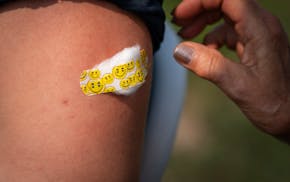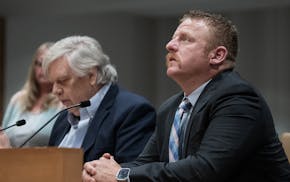A defendant in the Feeding Our Future case took the stand Wednesday, the only one of the case's seven defendants to testify in their own defense.
Mukhtar Mohamed Shariff, 33, of Burnsville, talked about his dream of becoming an entrepreneur and building several businesses in Seattle, years before he moved to Minnesota and got involved with the meal programs at the center of the federal fraud investigation.
"I've always wanted to do business and entrepreneurship," he told his attorney, Frederick Goetz, who began questioning him Wednesday.
Goetz asked him if the consulting company Shariff started years before he moved to Minnesota was a shell company to collect money from the federal child nutrition programs, since prosecutors allege defendants in the case laundered money through shell companies.
"Absolutely not," Shariff said.
Shariff's testimony was another surprise in the six-week federal trial, following the announcement Tuesday by six of the seven defendants that they would rest their case without calling any witnesses. Like them, Shariff was not expected to take the stand.
His testimony will continue Thursday, followed by cross examination from prosecutors. Closing arguments in the case are expected on Friday, with the jury deliberating on Monday.
The trial is the first one in a broader investigation that led to charges against 70 people who are accused of stealing federal money meant to fund meals for kids in need during the COVID-19 pandemic.
Prosecutors say it's one of the largest pandemic-related fraud cases in the United States, with more than $250 million stolen from programs run by the U.S. Department of Agriculture to reimburse schools, daycares and nonprofits for feeding low-income children after school and during the summer.
Prosecutors allege the defendants created shell companies to launder money, submitted rosters of made-up children's names and inflated meal claims to receive more than $40 million for 18 million meals at food sites from Rochester to St. Cloud. They claim that defendants used the money instead on lavish purchases, including a $1 million lakefront Prior Lake property, luxury cars and gold jewelry.
In the past month, prosecutors have called more than 30 witnesses, many of whom said they didn't see many people, if any, receiving meals at other food distribution sites run by the defendants.
On Wednesday, Shariff's attorneys called several witnesses who said they recalled long lines of cars receiving bags of groceries from Shariff and his team in a parking lot of Dar Al-Farooq Islamic Center in Bloomington. Eight witnesses testified that Shariff's company purchased more than $1 million worth of food for the meal programs and distributed food to hundreds of families at a Bloomington mosque.
On the witness stand Wednesday, Shariff spoke clearly and confidently, looking at the jury while answering Goetz's questions. He said he's always been drawn to starting businesses, ranging from selling items on eBay as a teen to running a shipping business on the side while working at Microsoft as a software engineer.
The other defendants are Said Shafii Farah, Abdiaziz Shafii Farah, Mohamed Jama Ismail, Abdimajid Mohamed Nur, Abdiwahab Maalim Aftin and Hayat Mohamed Nur. All seven were charged in 2022 with wire fraud and money laundering, among other charges. Their food sites were largely overseen by St. Paul nonprofit Partners in Nutrition (also known as Partners in Quality Care), as well as St. Anthony nonprofit Feeding Our Future, which is at the heart of the case.

Despite years of denial, Mpls. police used secretive process for serious misconduct

Defendant in Feeding Our Future trial testifies in his defense

Fond du Lac Band set to start cannabis production in northeastern Minnesota

What to know about the latest COVID variants, Minnesota testing, vaccines

